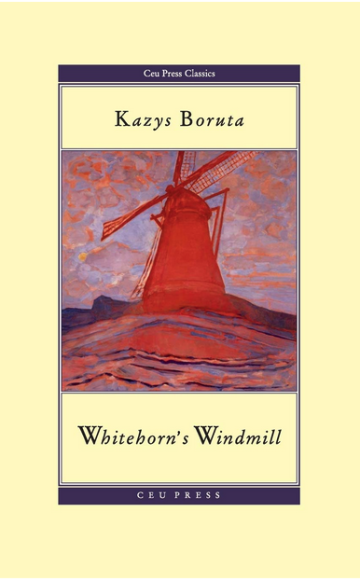Whitehorn's Windmill
Whitehorn's Windmill or The Unusual Events Once Upon a Time in the Land of Paudruve”, the reader will first be struck – and perhaps put off – by the simple, informal prose and fairy-tale setting. But this mid-20th-century Lithuanian classic – now out in an English translation from Central European University Press – is anything but provincial. Boruta weaves witches, old crones, morose devils, and talking animals together with the poetics of the most sophisticated – and pessimistic – European modernism.The windmill of the title serves PaudruvÄ—, an isolated village surrounded by marshland and bogs that are filled with creatures of pagan-lore who plot against the townsfolk:
The bogs were treacherous, even in the places where small meadows would grow, waving atop the surface as if the meadow were swimming on top of the water. Sometimes, standing atop a raised clump, you'd crash through into the quagmire, and you'd be lucky if you managed to grab hold of some shrub in time to save yourself, otherwise – you'd be buried alive. The marsh would pull you down to the bottom and leave no sign of where you'd fallen through.
Living within the bog is the devil PinÄÂçukas (a traditional Lithuanian name for a devil), who early in the novel approaches the lonely owner of the windmill, Whitey Whitehorn. Whitehorn accepts a pact with PinÄÂçukas to improve his life, leading to his marriage to a beautiful girl, MarcelÄ—. After a period of happiness, PinÄÂçukas ensures MarcelÄ— dies giving birth to their daughter, Jurga, leaving Whitehorn to raise her alone. As PinÄÂçukas does his utmost to divide the widower from his daughter as well, the village of PaudruvÄ— is plunged into “unusual events.”The village is itself small and there are only a few references to other rural hamlets, all of them as nondescript as PaudruvÄ—. Bortua almost seems to reject urban life. But Whitehorn's Windmill was written over a six-week period in 1942 – during the German occupation of Lithuania – and as the novel progresses, many parallels with the political circumstances of the time appear. When Whitehorn first meets the devil PinÄÂçukas, for instance, Boruta offers this satirical description:
In front of him stands this itsy-bitsy, silly little gentleman, like a German, with a little hat on his head, and what's more, a rooster feather stuck into it.
Like PaudruvÄ—, Lithuania's history is riddled with troublesome neighbors. The metaphor of the windmill is key to understanding Boruta's intent. PinÄÂçukas is comforted when the windmill's sail is moving, bored and mischievous when not. Representative of the problems caused by changing ideologies in Lithuania, the different wind currents can either bring calm or havoc to PaudruvÄ— – although, at the same, there is time an abiding feeling that once the windmill stops turning, all life will cease.However, Whitehorn's Windmill isn't only about twentieth century ideology – Boruta writes with humor and sections had me laughing aloud. At one point, for instance, Whitehorn tricks PinÄÂçukas into working at the windmill:
With pleasure he turned the mill's wings in place of the wind, looked after the millstones and did all the other work that Whitehorn entrusted him with. And he would have become an altogether decent miller, if it hadn't been for all sorts of devilish weaknesses. But what do you expect from a devil, when people are well acquainted with them, and after all, it's said the devil is the embodiment of all evil.
It is in the depictions of Lithuanian folk tradition that the heart of Whitehorn's Windmill lies, especially for an uninitiated English-language reader such as myself. The steadily paced fantastical elements, free of intrusive plot devices and didacticism, flow over the reader calmly, just as the current from Whitehorn's windmill would if he or she were standing beside it. Towards the end of the novel, Boruta poses the question: “What sort of fairy tale is this then?” He isn't claiming too much when he answers: “Why it's life itself!”
Kazys Boruta (1905–1965) was a Lithuanian writer and poet. Because of his political views, he spent years in prison both before and after WWII. In the last phase of his life in Soviet Lithuania, he earned a living by translations published under a pseudonym.

 Richard Jackson is a PhD candidate and freelance writer from the UK. He enjoys writing about Central and Eastern Europe and has submitted articles to journals such as Transitions Online and Literature Across Frontiers. He manages and writes for the website ‘Lemberik' –
Richard Jackson is a PhD candidate and freelance writer from the UK. He enjoys writing about Central and Eastern Europe and has submitted articles to journals such as Transitions Online and Literature Across Frontiers. He manages and writes for the website ‘Lemberik' –